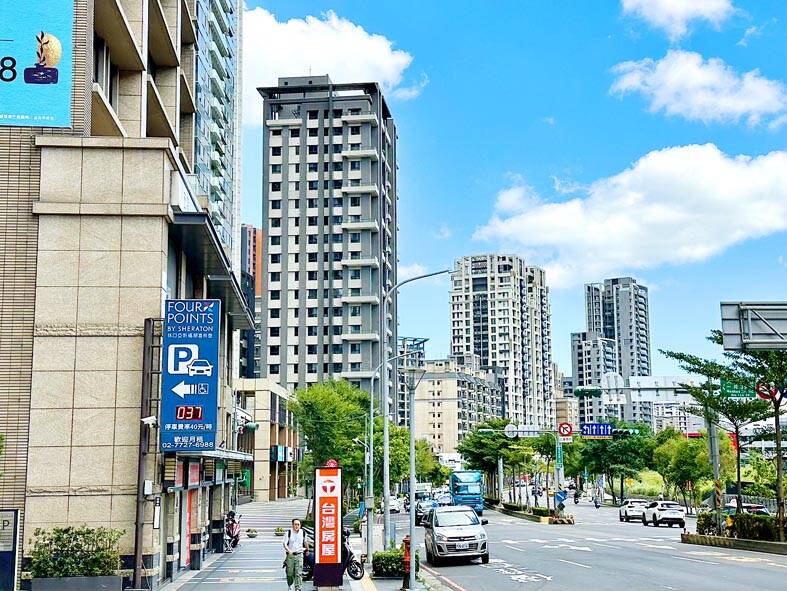Taiwan’s housing market showed tentative signs of stabilization last month, with property transfers in the six special municipalities totaling about 16,989 units — down 13.5 percent from a year earlier, but up 5.7 percent from September, real-estate brokerages said on Monday.
“The latest data indicate the market might have reached a near-term floor, as the pace of decline has not deepened,” Sinyi Realty Inc (信義房屋) research manager Tseng Ching-der (曾敬德) said in a report.
The market appears to be bottoming out, supported by resilient end-user demand and slower price increases, he said.

Photo: Hsu Yi-ping, Taipei Times
Policy adjustments have helped underpin sentiment, he said, adding that in September, the Financial Supervisory Commission exempted first-time home buyers from mortgage restrictions, while the central bank extended the grace period for home upgraders to sell their original property from 12 to 18 months.
A strong TAIEX and related wealth effect also lent support, Tseng said.
Among the six cities, Tainan posted the steepest decline, with housing transfers plunging 33.2 percent to 1,527 units, followed by Taipei’s 22 percent drop to 1,758 units and Kaohsiung’s 16.2 percent fall to 2,494 units on an annual basis, data compiled by local land administrations showed on Monday.
New Taipei City recorded the mildest decrease, down 3.6 percent to 4,204 units, while Taichung slipped 8.3 percent to 3,766 units and Taoyuan fell 11.4 percent to 3,240 units, the data showed.
In the first 10 months of the year, total housing transfers in the six cities decreased 26.6 percent year-on-year to 168,785 units, the lowest for the same period in eight years.
Tseng said the annual tally might struggle to surpass 260,000 units amid lingering market softness.
Last month’s figures mainly reflect deals struck in September, as paperwork typically takes at least a month to complete, said Chen Chin-ping (陳金萍), deputy research head at Evertrust Rehouse Co (永慶房屋).
More time is needed to gauge the impact of targeted credit easing, although buyer confidence has improved slightly, and wait-and-see behavior has eased, Chen said in a separate report.
Both Chen and Tseng said the central bank’s stance toward the domestic housing market would remain a key driver of future direction, even though the fourth quarter is traditionally the busy season for housing transactions.
The central bank is scheduled to review its mortgage curbs next month to determine whether to maintain them next year.
Taiwan’s ongoing trade negotiations with the US could also have significant influence over market sentiment, the analysts said.

In Italy’s storied gold-making hubs, jewelers are reworking their designs to trim gold content as they race to blunt the effect of record prices and appeal to shoppers watching their budgets. Gold prices hit a record high on Thursday, surging near US$5,600 an ounce, more than double a year ago as geopolitical concerns and jitters over trade pushed investors toward the safe-haven asset. The rally is putting undue pressure on small artisans as they face mounting demands from customers, including international brands, to produce cheaper items, from signature pieces to wedding rings, according to interviews with four independent jewelers in Italy’s main

Japanese Prime Minister Sanae Takaichi has talked up the benefits of a weaker yen in a campaign speech, adopting a tone at odds with her finance ministry, which has refused to rule out any options to counter excessive foreign exchange volatility. Takaichi later softened her stance, saying she did not have a preference for the yen’s direction. “People say the weak yen is bad right now, but for export industries, it’s a major opportunity,” Takaichi said on Saturday at a rally for Liberal Democratic Party candidate Daishiro Yamagiwa in Kanagawa Prefecture ahead of a snap election on Sunday. “Whether it’s selling food or

CONCERNS: Tech companies investing in AI businesses that purchase their products have raised questions among investors that they are artificially propping up demand Nvidia Corp chief executive officer Jensen Huang (黃仁勳) on Saturday said that the company would be participating in OpenAI’s latest funding round, describing it as potentially “the largest investment we’ve ever made.” “We will invest a great deal of money,” Huang told reporters while visiting Taipei. “I believe in OpenAI. The work that they do is incredible. They’re one of the most consequential companies of our time.” Huang did not say exactly how much Nvidia might contribute, but described the investment as “huge.” “Let Sam announce how much he’s going to raise — it’s for him to decide,” Huang said, referring to OpenAI

The global server market is expected to grow 12.8 percent annually this year, with artificial intelligence (AI) servers projected to account for 16.5 percent, driven by continued investment in AI infrastructure by major cloud service providers (CSPs), market researcher TrendForce Corp (集邦科技) said yesterday. Global AI server shipments this year are expected to increase 28 percent year-on-year to more than 2.7 million units, driven by sustained demand from CSPs and government sovereign cloud projects, TrendForce analyst Frank Kung (龔明德) told the Taipei Times. Demand for GPU-based AI servers, including Nvidia Corp’s GB and Vera Rubin rack systems, is expected to remain high,